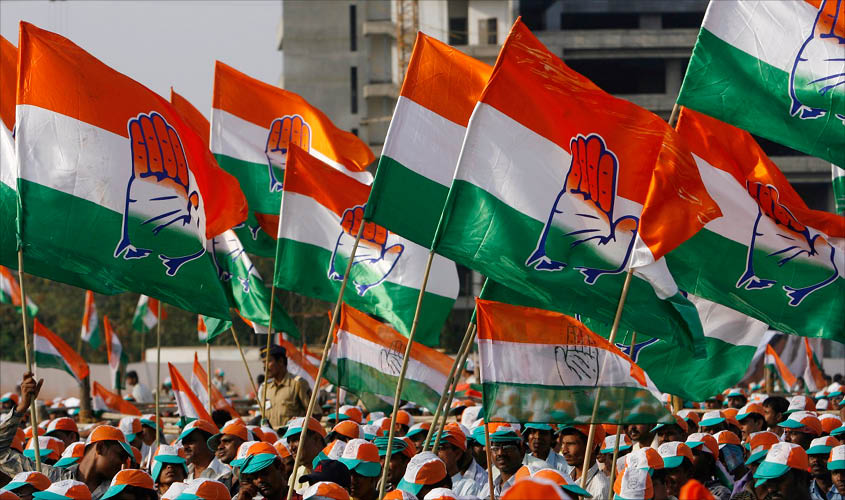In the hope of leading a united front against the Bharatiya Janata Party (BJP)-led National Democratic Alliance (NDA) government at the Centre in the 2019 general elections, the Congress has identified four states to carve out an alliance with regional parties. The Congress intends to target West Bengal, Bihar, Uttar Pradesh and Tamil Nadu, with an eye on 201 seats that it is “optimistic” about. The party is likely to make a move on the alliance front after gauging the proceedings of the ongoing monsoon session of Parliament.
On the condition of anonymity, a senior Congress leader said, “If we clinch these four states, it should be enough. We are optimistic about forging alliances in these four states. However, all this is in the planning stage. Formal discussions are only expected to start after the Parliament session is over.”
The four states targeted by Congress to forge alliances with regional parties collectively have 201 seats in Lok Sabha: West Bengal (42), Uttar Pradesh (80), Bihar (40) and Tamil Nadu (39). Senior party leaders want an alliance to be sorted out first in Uttar Pradesh, since it will act as a precedent for talks in the rest of the states.
The four states being eyed by the Congress will get their co-ordination committees that will act as mediators for alliances. Every state will get its co-ordination committee, which will be headed by a leader accepted by all the parties in the alliance. The state alliance’s head will be the principal player in facilitating seat sharing arrangements.
To set the tone for 2019, the Congress is likely to organise an “Opposition Conclave” after the monsoon session of Parliament is over. The conclave is expected to act as a trailer for various Opposition parties to communicate with each other to form a collective strategy for 2019. It is not yet clear where or when the conclave will take place and who will participate in it.
Generally, there are levels to forging political alliances for contesting elections. The first is the principal agreement that a party will contest election in an alliance; the second is which party will contest how many seats and the third is identifying whose candidate will contest from which seat. In that context, the Congress intends to keep its doors open for post-poll alliances as well.
A senior party leader said, “There are some regional parties who will come in the last minute. We are hopeful for few post poll alliances as well. The Telangana Rashtriya Samiti (TRS) and Telugu Desam Party (TDP) might be willing to join us after elections. We have kept all our options open.”
However, the four states being targeted by Congress for forging alliances are not going to be a cakewalk. In West Bengal, there is a severe divide among Congress party workers on aligning with Trinamool Congress (TMC) or the Communist Party of India (Marxist).
While there is a section that believes that aligning with TMC is the best chance to get maximum seats, the other section sees it as a “suicide”, alleging that TMC is the reason why the BJP has been able to make inroads in the state. Party workers have sent reports to the high command in Delhi explaining how the TMC is responsible for weakening the Congress and the Left and hence it cannot be allied with.
In the 2014 Lok Sabha elections, TMC won 34 seats, Congress four, while the CPM and BJP won two each. BJP has an ambitious target of winning over 20 seats in 2019. It has gained in vote share over the past few months in various elections and emerged as the TMC’s main opponent. Rahul Gandhi’s visit to Bengal two weeks back was supposed to address these concerns before taking a decision over an alliance.
In Bihar, early surveys conducted by some media organisations show that a Congress and Rashtriya Janata Dal (RJD) alliance may score around 29/40 seats in the general elections. The victory in the March bypolls in Bihar has boosted the Congress-RJD’s hopes for 2019. However, if the ruling alliance between BJP and Chief Minister Nitish Kumar’s JDU falls apart, then the Opposition will have to prepare for a three-cornered fight that is likely to benefit the BJP alone. In 2014, the BJP won 22 seats, while its allies LJP won six and Rashtriya Lok Samata Party (RLSP) got three. The JDU, which contested alone, won only two seats, while the RJD got four seats and Congress two seats.
Similarly, in Uttar Pradesh, the united Opposition’s victory in bypolls boosted the Congress’ chances to secure seats, but the biggest challenge lies in seat sharing and choosing the alliance leader. In 2014, BJP won 71 seats, while its ally Apna Dal secured two. SP won five seats and two were bagged by Congress. The BSP did not win a single seat, though it kept its core vote base intact. For 2019, while it seems that the SP and BSP should contest on maximum seats given their voter base, Congress will want more exposure which will not be easy to score due to its negligible popularity in the state.
In Tamil Nadu, the Congress’ immediate challenge is in overcoming the factions within the party. Rahul Gandhi had announced revamping of the party structure in the state, but state workers have been reluctant in accepting newcomers as block level leaders. On the alliance front, the DMK has said it would continue to be an ally to Congress and is in a better position to win the polls than a fractured and leaderless AIADMK.

